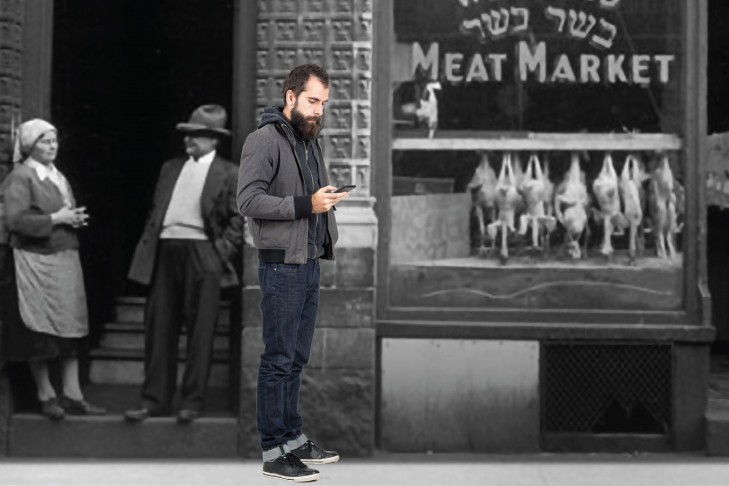As the artistic director of the Jewish Arts Collaborative, I spend most of my time foraging, researching and, eventually, sharing new gems from our tradition.
Here are just a few of the wonderful and unusual things that I discovered while developing the JArts fall season:
- Chelsea was once called “Little Jerusalem” and was second only to NYC in the percentage of Jewish residents. At one point, Jews were over 40 percent of the city’s population. Learn more here.
- Woody Guthrie, writer of “This Land Is Your Land,” also wrote songs inspired by his mother-in-law, the progressive Yiddish poet Aliza Greenblatt. In other words, the same guy who was awed by the vast beauty of the American West in…
As I went walking that ribbon of highway
I saw above me that endless skyway
And saw below me that golden valley
This land was made for you and me
…also found inspiration in his Jewish neighborhood in Brooklyn:
Mermaid Avenue, that’s the street
Where the lox and bagels meet
Where the hot dog meets the mustard
Where the sour meets the sweet
Check out our Woody Guthrie program with his daughter, Nora, and Lorin Sklamberg, lead singer of Grammy winners The Klezmatics.
- Over a century ago, Jewish and Italian immigrants lived side-by-side in the North End. I wonder if the local bubbes and nonnas ever debated the merits of kreplach vs. ravioli? See and taste for yourself.
- Have you ever called chicken soup “Jewish Penicillin?” It turns out the earliest reference to the medicinal use of chicken soup is dated to the 12th century and Maimonides. In his book, “On the Cause of Symptoms,” the revered sage (and physician) prescribes chicken soup for such maladies as asthma, malnutrition, “neutralizing body constitution” and even as treatment for leprosy. You can taste 10 different chefs’ versions of it on Sunday, Nov. 4.
- What do a camel and a Hanukkah menorah have in common? The Mishnah. Here’s the first reference to the Hanukkah menorah made in the Mishnah: If a camel knocks over a lamp, causing a fire, the rabbis say the camel driver is responsible if the lamp is indoors; but if the lamp is outside a shop, the shopkeeper is liable. Rabbi Jehudah provides an exception to this rule: The shopkeeper isn’t liable if the lamp is a “Hanukkah lamp.” Please leave your camel at home and join us at Boston’s most exciting Hanukkah happening on Dec. 5 at the MFA.
From Chelsea to Natick, music to museums, modern Israeli art to the history of Jewish Boston, I hope you enjoy the JArts fall season. Better yet, I hope you get to feel that same excitement I do when I discover something new and wonderful about what makes us who we are today.
This post has been contributed by a third party. The opinions, facts and any media content are presented solely by the author, and JewishBoston assumes no responsibility for them. Want to add your voice to the conversation? Publish your own post here. MORE



